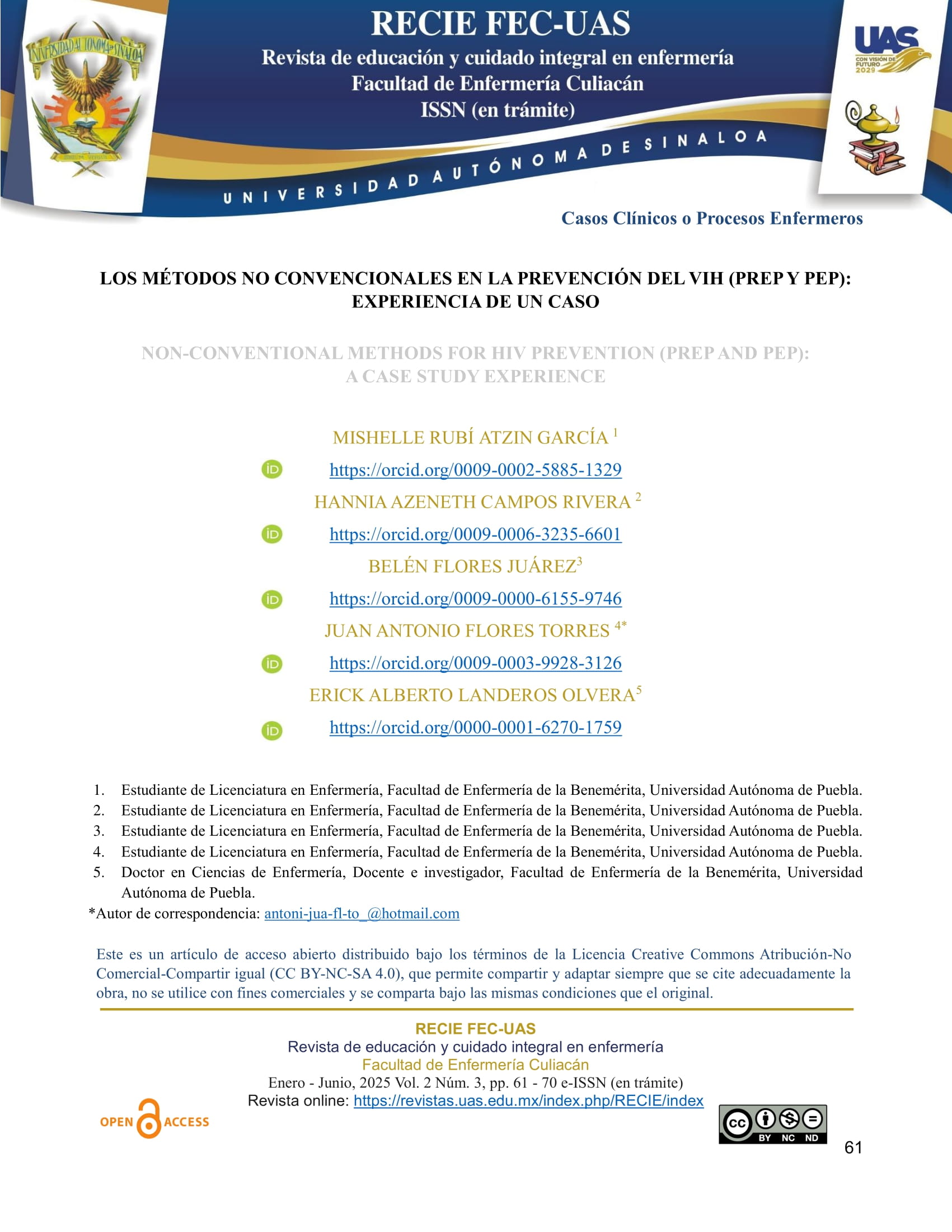Non-conventional methods for HIV prevention (PrEP and PEP): a case study experience
Keywords:
Discrimination, Medication, PrEp, PEP, HIVAbstract
Introduction: Non-conventional methods such as PrEP and PEP for HIV prevention are an effective tool, however, due to not having sufficient knowledge, they are not used correctly, which is why a situation is described that requires how. Medicines are distributed and delivered to people who have risk situations. Objective: Describe the use of new non-conventional methods for HIV prevention in an epidemiological framework that justifies their use within the framework of a case experience. Development: The main barrier that limits access to health services and social support for these people. This degrading situation is a priority within the objectives of this organization for the authorization of receiving non-conventional methods and controlling and reducing the spread of HIV. Conclusion: The aforementioned story questions how people who have a risk situation with HIV are discriminated against and treated, which is related to their sexual orientation and the stigma that exists regarding the union between the two, which makes They have little access to these medications, due to mistreatment, poor distribution, grief or fault of the person.
Downloads
References
Ayerdi, O., Orviz, E., Valls Carbó, A., Fernández Piñeiro, N., Vera García, M., Puerta López, T., Ballesteros Martín, J., Rodríguez Martín, C., Baza Caraciolo, B et al. (2024). Incidencia de infecciones de transmisión sexual y modelos de cribado entre usuarios de profilaxis preexposición frente al VIH. Enfermedades infecciosas y microbiología clínica, 42(6); 570-576. DOI: https://doi.org/10.1016/j.eimc.2024.01.003
Centros Ambulatorios de Prevención y Atención en SIDA e Infecciones de Transmisión Sexual [CAPASITS]. (2021). Servicios de salud VIH y VHC. https://www.gob.mx/censida/acciones-y-programas/centros-de-atencion-sais-y-capasits#:~:text=El%20Centro%20Ambulatorio%20para%20la,transmisi%C3%B3n%20sexual%2C%20de%20forma%20ambulatoria
Galván Benítez, A. D. (2024). ADHERENCIA AL PROCESO DE ATENCIÓN A VÍCTIMAS DE VIOLENCIA. [Tesis de maestría, Universidad de Córdova], Unicordoba, 1- 131. https://repositorio.unicordoba.edu.co/server/api/core/bitstreams/e983c5d9-4f80-441a-ba27-d57c0f961aa5/content
Instituto Mexicano del Seguro Social [IMSS]. (2024). Preservativo o condón masculino. https://www.imss.gob.mx/salud-en-linea/planificacion-familiar/preservativo
Organización de las Naciones Unidas [ONU]. (2021). Los preservativos constituyen una parte fundamental de la prevención combinada. ONU/SIDA. https://www.unaids.org/es/resources/presscentre/featurestories/2021/november/20211122_condoms-critical-part-combination-prevention
Organización Mundial de la Salud [OMS]. (2024). VIH y sida. https://www.who.int/es/news-room/questions-and-answers/item/hiv-aids
Organización Panamericana de Salud [OPS]. (2024). Prevención combinada por el VIH. https://www.paho.org/es/temas/prevencion-combinada-infeccion-por-vih
Pierre Jirón, J., Sandoval, C., Enciso, J.C et al. (2021). Brief intervention to prevent HIV, STI and unintended pregnancies: preliminary results of a feasibility study from the perspective of healthcare providers in Peru. Part of Springer Nature. DOI:https://doi.org/10.1186/s12913-021-07229-y
Sánchez-Medina, R., Rosales-Piña, C. R., Enríquez-Negrete, D. J., Zúñiga-Rodríguez, M., y Gómez Lamont, M. F. (2023). Modelo de comunicación sobre el uso del condón en hombres. Ciencias psicológicas, 17(1). DOI: https://doi.org/10.22235/cp.v17i1.2848
Secretaría de Salud [SS]. (2024). Boletín epidemiológico. Sistema Nacional de Vigilancia Epidemiológica Sistema Único de Información, 1-80. https://www.gob.mx/cms/uploads/attachment/file/953581/sem42.pdf
Unidad Médico Familiar [UMF]. (2022). Protocolo de atención integral/Enfermedad por Virus de Inmunodeficiencia Humana. 1-91.

Downloads
Published
Issue
Section
Categories
License
Copyright (c) 2025 RECIE FEC-UAS Revista de educación y cuidado integral en enfermería Facultad Enfermería Culiacán

This work is licensed under a Creative Commons Attribution-NoDerivatives 4.0 International License.

